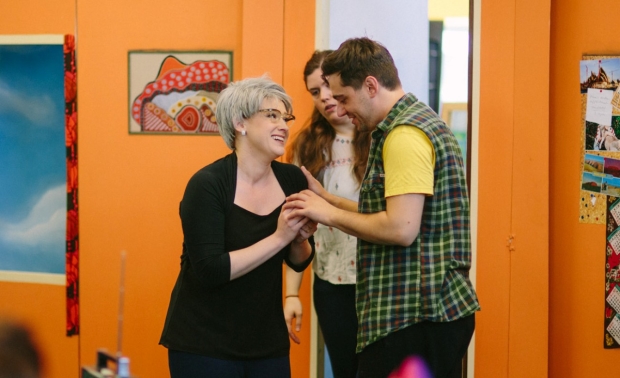Review: Silver Electra (Wilton's Music Hall and tour)

© Daniel Kuell
It’s a hotchpotch of a plot, so if you're a grown-up you'll need to take a child along to explain it. Preferably one who’s done research into unreliable narration in the theatre, dementia in the elderly, and the life and disappearance of the trailblazing aviator Amelia Earhart.
English Touring Opera‘s latest commission from composer Russell Hepplewhite is aimed at a school-age audience, though there were surprisingly few under-greys in the audience when I caught it. That’s possibly—though I speculate—because it’s the Easter holidays and Silver Electra is the kind of show that will appeal more to enlightened schoolteachers than to parents.
Anyway, back to that plot. Let’s take a run at it. We are asked to imagine that Earhart, who disappeared without trace towards the end of her epic round-the-world flight in 1937, may have survived and made a new, secret life for herself in Australia. We are not, though, asked to consider why she would do such a thing. By the 1970s she is Milly, an old woman with Alzheimer's whose daughter, Bindi, has a new man in her life and an unhappy son called Noah who's about to do a runner. As this troubled family threatens to fall apart, truths from the distant past resurface and an aerial adventure helps put everything right.
That seems to be the storyline, but neither the libretto nor the direction, both by Tim Yealland, are much concerned with narrative clarity. The time period hops like a kangaroo from the 70s to the 30s and back again, and to make it work the four performers have to engage in some curious doubling, as when the youthful Amanda Wagg dons a grey wig and a stoop to play the senile version of Amelia but it’s Alison Manifold, aka Bindi, who plays her younger self in flashback.
'Antiopodean-sunny and primary-coloured'
Not even the cast’s tacked-on introduction and postscript can untangle the mental knots in this text-heavy hour; but at least it’s a lively and confident experience, breezily played against a set of colourful if rickety flats (designs by Jude Munden) and beautifully sung by Dominic Walsh and Henry Neill as well as by Manifold and Wagg. (N.B. ETO also has an alternate company in order to cope with the plethora of tour dates.)
Hepplewhite’s music, Antiopodean-sunny and primary-coloured, carries the action happily even though it does not delve as deeply into its material as an opera should. The composer’s real strength lies in his succulent orchestration for just four crack musicians. Jack Ridley directs from the keyboard and gets energised performances from everyone, with some terrific percussion work to underpin the many moods.
Yealland’s uncertain sense of theatrical style involves plenty of fourth-wall-breaking address plus the recruitment of child helpers from the audience and a singalong episode. Did someone decide it needs some panto-charged assistance to grip its target audience? And besides, who would that audience be, exactly? ETO says that Silver Electra is intended for Key Stages Two and Three, but the subject matter and its presentation are too oblique for a seven-year-old and too juvenile for an adolescent. Age 11-12 seems about right.
Nice planes, by the way. And you get one to take home.
Silver Electra reaches the Curve in Leicester on 13 April, then tours to theatres and schools nationwide until it reaches the Thameside Theatre, Grays on 13 and 14 June.










